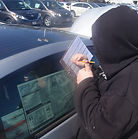

FRANKLIN HIGH SCHOOL
Advanced Placement
Environmental Science


COMMUNITY EXPERIENCES

See the details about some of our COMMUNITY EXPERIENCES below. These excursions take place during a normal 84-minute block, so you will NOT miss other classes! Instead of staying in the classroom, we will load up a school bus and a van, and will travel to learn about something in the community that relates to the curricular area we are covering.
These mini-trips are possible because of volunteers in the community who are willing to accommodate us. We must always represent FHS with pride when interacting with our community contacts! You will know about these excursions ahead of time, and will oftentimes need to dress for the weather or activity. In the event of cancellation, you will be notified via text and/or email, and we will have a normal class period at FHS instead of the off-site experience. These experiences are NOT optional, because they take place during our usual class time.
THE COMMUNITY EXPERIENCES BELOW ARE ONES WE'VE DONE BEFORE. THIS YEAR, WE MAY GO ON ALL OF THESE, SOME OF THESE, OR EVEN MORE ADVENTURES THAN ARE LISTED HERE (IF OTHER OPTIONS PRESENT THEMSELVES). OUR COMMUNITY EXCURSIONS ARE A KEY COMPONENT TO UNDERSTANDING CONNECTIONS BETWEEN CLASS TOPICS AND THE REAL WORLD!

UNIT(S): Water
Oak Creek Water Utility
Facility Tour
Students tour the facility where Franklin's water is pulled in from Lake Michigan and purified for drinking and other residential, commercial, and industrial uses.

UNIT(S): Water
Root River Parkway
Macroinvertebrate Study
Using organisms that live in the water column as water quality indicators, students conduct a biotic index tally, and calculate the health of the stream.

UNIT(S): Ecology
Hunger Task Force Fish Hatchery
Mark-Recapture Survey
Students use standard techniques to catch, mark, and then recapture fish in a controlled environment to test the validity of the mathematical models used to estimate population sizes.

UNIT(S): Land
Payne & Dolan
Quarry Tour
Aggregate experts let students explore how the facility uses ecologically safe and environmentally sound methods of operation to extract, process, and deliver products essential to the construction industry.

UNIT(S): Energy / Land / Sustainability
Sendik's Foods
Grind2Energy Food Waste Recycling System
To minimize landfill impact, Sendik's uses a grinding system to store and transport food scraps for processing to create methane from anaerobic digestion. The methane is used for energy.

UNIT(S): Ecology
Milwaukee County Parks
Bluebird Nestbox Surveys
Students assist the Milwaukee County Parks by monitoring bluebird nestboxes from nest building through fledging over weeks of growth and development. Thanks to the efforts of many, bluebird populations are doing very well!

UNIT(S): Energy / Air / Sustainability
TBD Car Dealership
Alternative Fuel Vehicles / Emissions Study
By utilizing gas mileage and engine size data from the window stickers of vehicles, students graph the relationships between CO2 emissions and these factors. Students also explore the latest models of alternative fuel vehicles.

UNIT(S): Ecology / Land / Sustainability
Conservancy for Healing
Natural Landscapes
Landscape design, land management, and outdoor learning are all part of our efforts at the Conservancy. Our primary goal is to create natural spaces that allow cancer patients a chance to heal, both physically & emotionally.

UNIT(S): Ecology (Bioremediation of Invasives)
The Nature Conservancy
Purple Loosestrife Beetle Project
Students dig invasive plants from wetlands, grow those plants in a controlled setting, and introduce beetles that eat just that type of plant (purple loosestrife). The beetles reproduce, and are later reintroduced to the wetland.

UNIT(S): Ecology
Milwaukee County Parks
Turtle Survey
Milwaukee County Parks field technicians work cooperatively with students to collect turtle data to track population size, growth rates, sex ratios, and species biodiversity within the design of an ongoing study.

UNIT(S): Waste / Recycling / Energy
Waste Management
Franklin Landfill Tour
Students drive to the top of the Franklin Municipal Landfill and get an overview of the operation of the facility. Recycling, methane capture, groundwater monitoring, and other key factors are discussed during the tour.

UNIT(S): Ecology
Rainbow Property (Milw County Parks)
Trail Camera Green Corridor Project
Motion-activated cameras are used to monitor movement of a variety of species through the Root River Parkway. Students collect memory cards to see what types of wildlife are utilizing the green spaces we have in Franklin.

UNIT(S): Ecology
Milwaukee County Parks
Wetland monitoring
Students use minnow traps to identify species of amphibians, fish, and crayfish that exist in various ephemeral ponds in Franklin. We are proud to have identified certain key species that call Franklin their home!

UNIT(S): Population
Cemeteries of Franklin
Life Expectancy Activity
Students visit a number of different cemeteries in Franklin, and use data from burial sites to determine sex ratios, average age at death, infant mortality, and other information to identify data trends over time.
